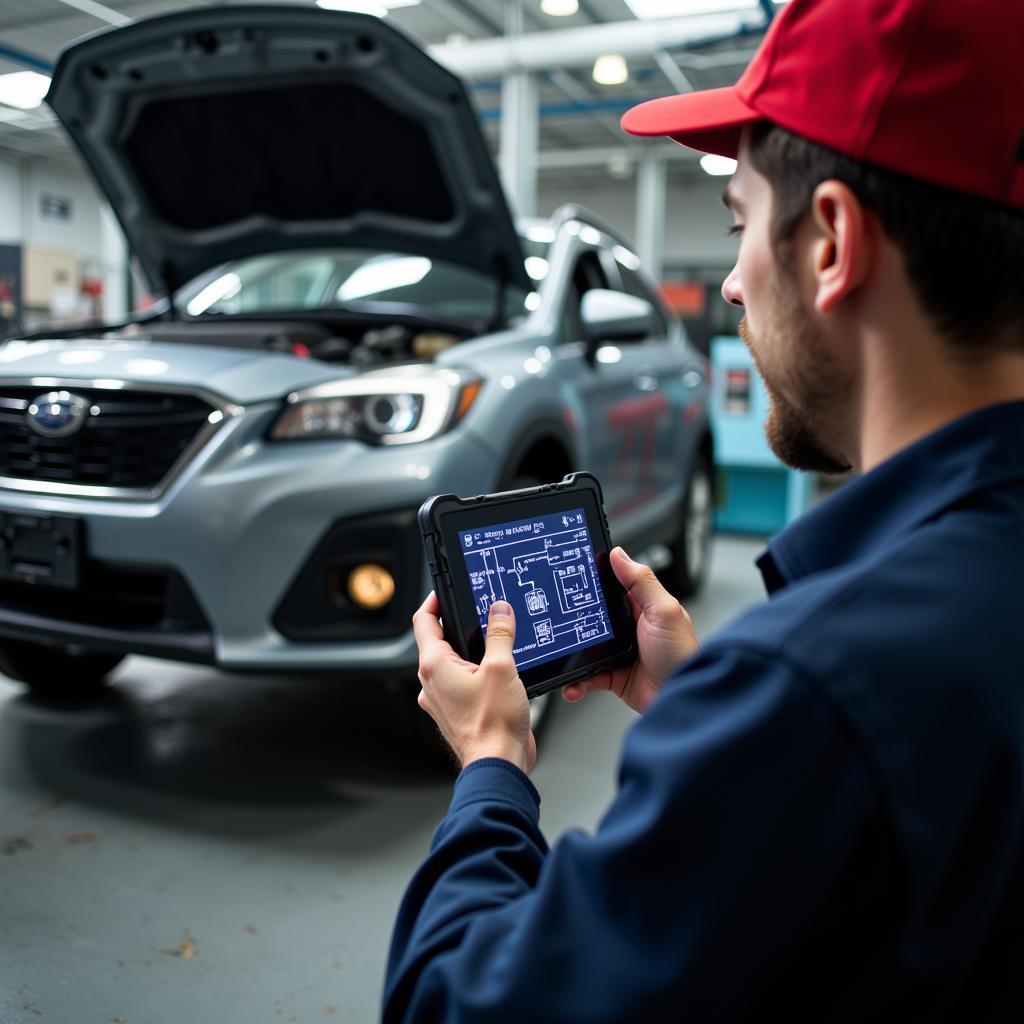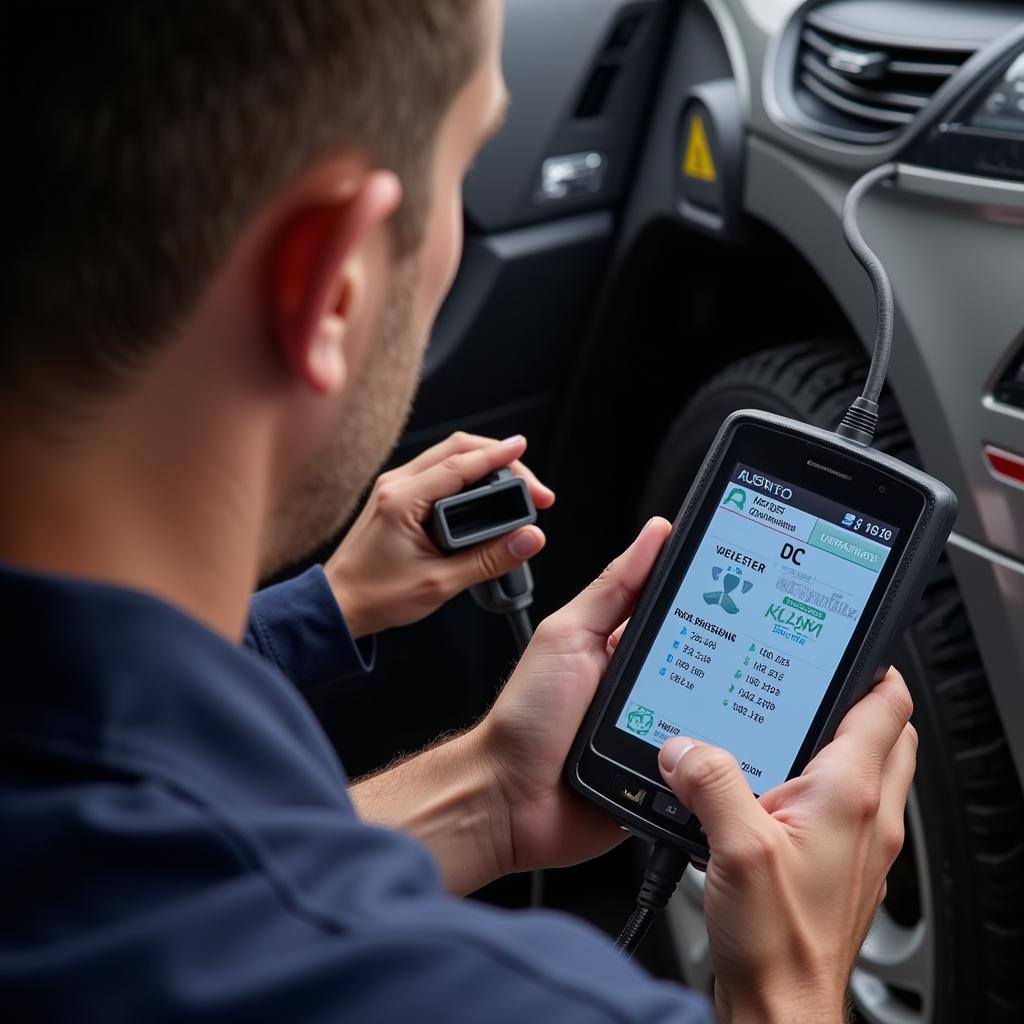Modern vehicles are complex machines with intricate electrical systems that control everything from engine performance to safety features. Electrical diagnostics have become an indispensable part of car maintenance and repair, allowing technicians to identify and resolve issues quickly and efficiently. This comprehensive guide will delve into the world of Electrical Diagnostics For Cars, exploring its importance, common procedures, and the benefits it offers car owners.
Understanding the Importance of Electrical Diagnostics for Cars
 Car Electrical System Diagnosis
Car Electrical System Diagnosis
Gone are the days of relying solely on mechanical know-how to troubleshoot car problems. As vehicles have become increasingly reliant on sophisticated electronic components, the need for accurate electrical diagnostics has grown exponentially. Electrical systems in modern cars encompass a wide range of components, including:
- Battery and Charging System: The battery provides the initial power to start the engine, while the charging system ensures the battery remains charged.
- Starting System: This system is responsible for cranking the engine to initiate the combustion process.
- Ignition System: The ignition system generates the spark needed to ignite the air-fuel mixture in the engine cylinders.
- Lighting System: This system includes headlights, taillights, turn signals, and interior lights, ensuring visibility and safety.
- Sensors and Actuators: Modern cars use numerous sensors to monitor various parameters like engine temperature, oxygen levels, and wheel speed. Actuators, on the other hand, convert electrical signals into mechanical actions, controlling components like fuel injectors, throttle valves, and ABS modules.
- Entertainment and Navigation Systems: Infotainment systems, navigation units, and other convenience features rely heavily on complex electrical circuits.
A malfunction in any of these systems can lead to a wide range of issues, from minor inconveniences to serious drivability problems. Electrical diagnostics play a crucial role in identifying the root cause of these issues, preventing unnecessary guesswork and potentially costly repairs.
Common Electrical Diagnostic Procedures
 OBD-II Scanner in Use
OBD-II Scanner in Use
When you take your car to a mechanic for electrical diagnostics, they will typically follow a systematic approach to pinpoint the problem. Some common diagnostic procedures include:
- Visual Inspection: Technicians begin by visually inspecting the wiring, connectors, and components for any obvious signs of damage, corrosion, or loose connections.
- OBD-II Scan: Most cars manufactured after 1996 are equipped with an On-Board Diagnostics (OBD-II) port. Technicians use an OBD-II scanner to retrieve diagnostic trouble codes (DTCs) stored in the vehicle’s computer. These codes provide valuable insights into the specific areas where faults have been detected.
- Battery and Charging System Test: This involves testing the battery’s voltage and charging capacity, as well as the alternator’s performance.
- Voltage and Resistance Tests: Using a digital multimeter, technicians measure voltage and resistance across various circuits and components to identify shorts, open circuits, or abnormal resistance values.
- Component Activation: Diagnostic tools can be used to activate specific components, such as actuators or solenoids, to verify their functionality.
Benefits of Electrical Diagnostics
Investing in regular electrical diagnostics for your car offers a range of benefits:
- Early Detection and Prevention: Regular diagnostics can detect minor electrical issues before they escalate into major problems, saving you from costly repairs down the line.
- Accurate Diagnosis: Gone are the days of replacing parts based on guesswork. Electrical diagnostics provide accurate information, allowing technicians to pinpoint the root cause of the issue and perform targeted repairs.
- Improved Safety: Malfunctioning electrical systems can compromise safety features like lights, airbags, and anti-lock brakes. Diagnostics ensure these systems function optimally, keeping you and your passengers safe on the road.
- Enhanced Performance: Electrical issues can affect engine performance, fuel efficiency, and overall drivability. Diagnostics help restore optimal performance by addressing underlying electrical problems.
- Increased Resale Value: A well-maintained car with a documented service history, including regular electrical diagnostics, holds a higher resale value.
The Future of Electrical Diagnostics
 Advanced Car Diagnostic Software
Advanced Car Diagnostic Software
As automotive technology continues to advance, so too will the field of electrical diagnostics. We can expect to see:
- More Advanced Diagnostic Tools: Diagnostic tools are becoming increasingly sophisticated, offering more detailed information and capabilities.
- Remote Diagnostics: The rise of connected cars has paved the way for remote diagnostics, allowing technicians to access vehicle data and diagnose problems remotely.
- Predictive Diagnostics: Advanced algorithms and machine learning are being used to analyze vehicle data and predict potential issues before they occur, enabling proactive maintenance.
Conclusion
Electrical diagnostics are no longer an optional extra but an essential aspect of modern car maintenance. By understanding its importance and embracing regular diagnostic checks, car owners can enjoy a safer, more reliable, and ultimately more cost-effective driving experience.
Frequently Asked Questions
Q: How often should I get electrical diagnostics for my car?
A: It’s generally recommended to have your car’s electrical system inspected at least once a year or as part of your regular maintenance schedule.
Q: Can I perform electrical diagnostics myself?
A: While basic checks can be done at home, it’s best to leave complex electrical diagnostics to qualified technicians with the right tools and expertise.
Q: What are some common signs of electrical problems in a car?
A: Common signs include flickering lights, slow starting, warning lights on the dashboard, malfunctioning accessories, and a dead battery.
Q: How much do electrical diagnostics typically cost?
A: The cost can vary depending on the complexity of the issue and the mechanic’s labor rates, but it’s generally a worthwhile investment to ensure accurate diagnosis and repair.
Q: Are electrical problems covered under car warranty?
A: Some electrical issues may be covered under your car’s warranty, especially if they are related to factory defects. Check your warranty terms for specific coverage details.
Looking for Car Diagnostic Services?
If you’re experiencing electrical issues with your car or simply want the peace of mind that comes with a thorough inspection, DiagFixPro can help. We offer a range of car diagnostic services, including car diagnostics hrt, car diagnostics rathmines, and car diagnostics hereford. Our team of experienced technicians uses the latest diagnostic equipment to accurately identify and resolve any electrical problems your car may have. To schedule an appointment or learn more about our services, contact us today.
For more information on car diagnostics and other automotive topics, check out our diagnostic check car and carly diagnostic app pages.
Need immediate assistance? Contact our 24/7 customer support team via WhatsApp: +1(641)206-8880 or Email: [email protected].

Leave a Reply